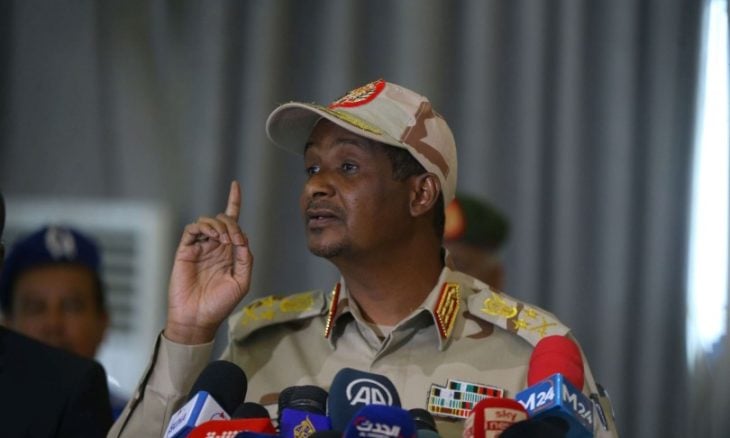
The advisor to the commander of the “Rapid Support Forces”, Ibrahim Mukhair, settled the debate about their position regarding the consultations conducted by some political and civilian parties to form a “parallel” government in Sudan, with its capital in Khartoum, confirming that it “will find full support and protection” from them, in contrast to the authority led by the army commander, Abdel Fattah al-Burhan, in Port Sudan in the east of the country. Extensive consultations took place in recent weeks in the Kenyan capital,
Nairobi, between political forces, the Revolutionary Front, and figures from the “Progress” alliance and outside it, discussing the formation of a “peace government” on the ground inside Sudan, in areas controlled by the “Rapid Support Forces” in western and central Sudan
.Mukhair said in a statement to Asharq Al-Awsat: “We have reached a conviction about the proposal presented by civilian politicians and their true intentions towards achieving peace in the country.” He added that “one of the most important reasons that drives us to support the formation of a government in the country is the failure of all existing institutions to view Sudanese as one people equal in citizenship, rights, and duties.”Anticipation for government announcement
There is an atmosphere of anticipation for the announcement of the government in the coming days, with the participation of some factions from the “Coordination of Democratic Civilian Forces” (Progress) which strongly rejects this step, considering it consolidates the division in the country.
The move also threatens to cause a split in the largest political alliance opposing the war in the country.The advisor to “Hemedti” said that “the country is moving rapidly towards division, in light of the separatist practices adopted by the Port Sudan government by issuing a new currency, organizing secondary certificate examinations, and depriving citizens in areas controlled by the (Rapid Support Forces) of these rights.” He added: “In light of all this, we have no choice but to support the establishment of a legitimate national government that exercises its authority over all the country’s territories, plays its role in protecting civilians and providing assistance to them, as well as opening doors to all international and regional efforts aimed at stopping the war and achieving peace.
“Earlier, the commander of the “Rapid Support Forces”, Mohamed Hamdan Dagalo (Hemedti) threatened to declare an independent authority in areas under his control, with Khartoum as its capital, if the army commander, Abdel Fattah al-Burhan, proceeded to form a government in Port Sudan in the east of the country.Intensive discussions took place in the Kenyan capital, Nairobi, during the past weeks between political forces, the Revolutionary Front, and figures from the “Progress” alliance and outside it, discussing the withdrawal of legitimacy from the Port Sudan government, and the formation of a government on the ground inside Sudan.The head of the Revolutionary Front and former member of the “Sovereignty Council”, Al-Hadi Idris, confirmed in statements last Thursday that the decision to form the government is irreversible, stressing that they will not abandon the formation of the government unless the warring parties decide to go to negotiations to end the fighting.Delegitimizing Port SudanIdris, who is also the deputy head of the civilian “Progress” alliance led by Abdullah Hamdok, the former Sudanese Prime Minister, said that the aim of forming a “parallel civilian government is to delegitimize the government that takes Port Sudan as a temporary capital, to cut off the plans of supporters of the Islamist regime (the former regime led by ousted President Omar al-Bashir) aimed at dividing the country, and also not to leave Sudan’s voice to the Islamic Front to speak on its behalf, and finally to force the other party (the army) to accept negotiations to stop the war.” Idris also pointed to his adherence to civil unity.The group calling for the formation of the parallel government sees the importance of consulting with the “Rapid Support Forces” on the matter, and agreeing on a political charter to be a reference for governance, expecting this step to find recognition from some countries.The founding conference of “Progress” held in the Ethiopian capital, Addis Ababa, last May, saw the circulation of the idea of forming a government parallel to the Port Sudan government headed by al-Burhan, but the proposal did not gain sufficient acceptance, then it was re-proposed at the meeting of the leadership body of “Progress” in Entebbe, Uganda, early this December, and was referred to a political committee for further consultation.Many political forces in the “Progress Coordination”, such as the National Umma Party, the Sudanese Congress Party, and professional and trade union civilian components, strongly reject the idea of forming a “parallel” government, fearing it would consolidate the division in the country.

